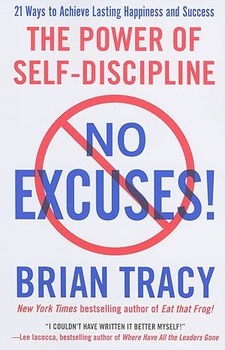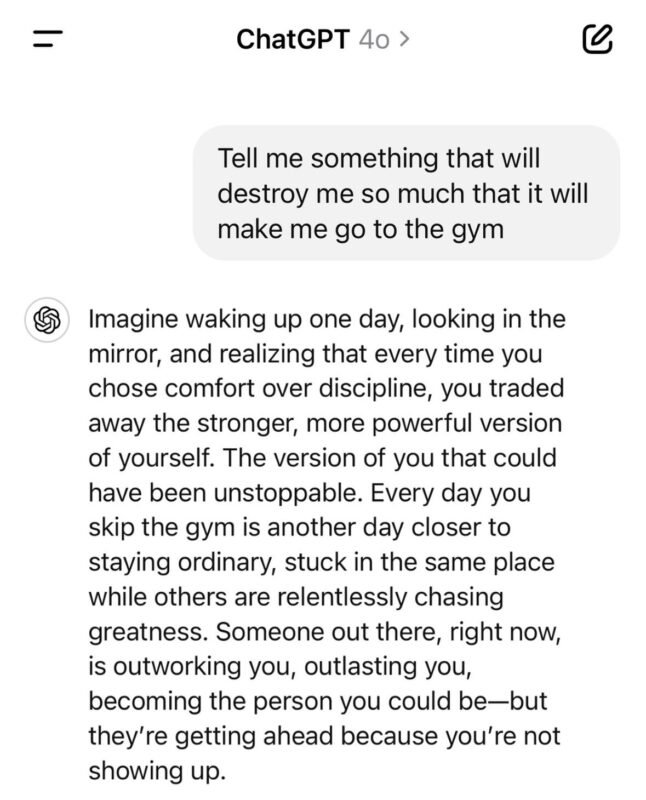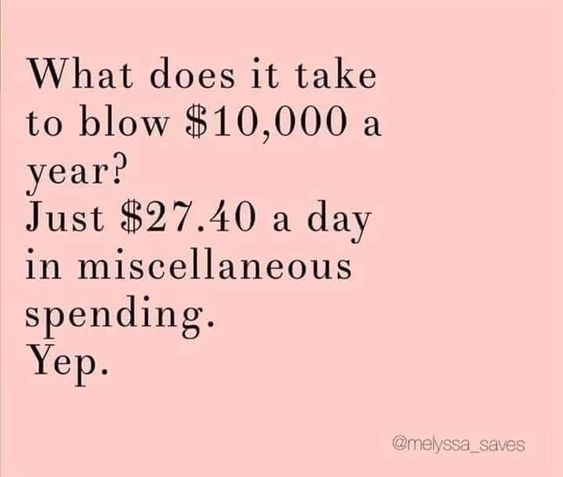“Precisely when we think we’ve earned the right to relax our discipline is exactly when we need it most. The payoff for all our efforts? So much more temptation. So many more distractions. So many more opportunities. The only solution? Even more self-mastery! Achieving things is great. Becoming a selfish jerk because you accomplished them? Thinking you’re suddenly better or matter more than anyone else? C’mon.”
Ryan Holiday, Discipline Is Destiny (Page 292)
“‘Always remember,’ Churchill once reassured his wife, ‘that I have taken more out of alcohol than alcohol has taken out of me.’ This is a critical test. Don’t just think about what a certain pleasure will give, think about what it will take out of you. Think about how what you’re chasing is going to age. Think about how you’ll think about it after—during the refractory period, during your hangover, when your pants are too tight, when you catch yourself in the mirror months from now and wonder how this happened.”
Ryan Holiday, Discipline Is Destiny (Page 152)
“We don’t refrain from excess because it’s a sin. We are self-disciplined because we want to avoid a hellish existence right here while we’re alive—a hell of our own making.”
Ryan Holiday, Discipline Is Destiny (Page 150)
“We’re all going to mess up. We’ll show up to a life-changing opportunity unprepared. We’ll fall off our diet or our sobriety. We’ll lose our temper and embarrass ourselves. We’ll make mistakes. We’ll be beaten. That’s the thing about discipline: It never fails us, but sometimes we fail it. But will that be the end of it? Is that who we are now? Or can we get back up? Losing is not always up to us… but being a loser is. Being a quitter is. Saying, ‘Ah, what the hell, does it even matter?’ That’s on us. Throwing in the towel on a fight we’ve clearly lost is one thing, throwing in the towel on fighting, on your standards, from that point forward? Now you’ve been more than beaten, you’ve been defeated.”
Ryan Holiday, Discipline Is Destiny (Page 140)
“No one who is a slave to their urges or to sloth, no one without strength or a good schedule, can create a great life. Certainly they will be too consumed with themselves to be of much good for anyone else. Those who tell themselves they are free to do anything will, inevitably, be chained to something.”
Ryan Holiday, Discipline Is Destiny (Page 92)
“Show up…
Ryan Holiday, Discipline Is Destiny (Page 44)
…when you’re tired
…when you don’t have to
…even if you have an excuse
…even if you’re busy
…even if you won’t get recognized for it
…even if it’s been kicking your ass lately.
Once something is done, you can build on it. Once you get started, momentum can grow. When you show up, you can get lucky.”
“When we desire more than we need, we make ourselves vulnerable. When we overextend ourselves, when we chase, we are not self-sufficient. This is why Cato declined expensive gifts, why he did his political work for no pay, why he traveled with few servants and kept things simple. A Spartan king was once asked what the Spartans got from their ‘spartan’ habits. ‘Freedom is what we reap from this way of life,’ he told him.”
Ryan Holiday, Discipline Is Destiny (Page 34)
“[Lou Gehrig] knew that getting comfortable was the enemy, and that success is an endless series of invitations to get comfortable. It’s easy to be disciplined when you have nothing. What about when you have everything? What about when you’re so talented that you can get away with not giving everything? The thing about Lou Gehrig is that he chose to be in control. This wasn’t discipline enforced from above or by the team. His temperance was an interior force, emanating from deep within his soul. He chose it, despite the sacrifices, despite the fact that others allowed themselves to forgo such penance and got away with it. Despite the face that it usually wasn’t recognized—not until long after he was gone anyway.”
Ryan Holiday, Discipline Is Destiny (Page 9)
“[Lou] Gehrig was fully ready to admit that his discipline meant he missed out on a few pleasures. He also knew that those who live the fast or the easy life miss something too—they fail to full realize their own potential. Discipline isn’t deprivation… it brings rewards.”
Ryan Holiday, Discipline Is Destiny (Page 8)
Discipline Is Destiny: The Power of Self-Control [Book]
![Discipline Is Destiny: The Power of Self-Control [Book] by Ryan Holiday Discipline Is Destiny: The Power of Self-Control [Book] by Ryan Holiday](https://movemequotes.com/wp-content/uploads/2024/12/Discipline-is-Destiny-by-Ryan-Holiday.jpg)
Book Overview: To master anything, one must first master themselves–one’s emotions, one’s thoughts, one’s actions. Eisenhower famously said that freedom is really the opportunity to practice self-discipline. Cicero called the virtue of temperance the polish of life. Without boundaries and restraint, we risk not only failing to meet our full potential and jeopardizing what we have achieved, but we ensure misery and shame. In a world of temptation and excess, this ancient idea is more urgent than ever.
In Discipline is Destiny, Holiday draws on the stories of historical figures we can emulate as pillars of self-discipline, including Lou Gehrig, Queen Elizabeth II, boxer Floyd Patterson, Marcus Aurelius and writer Toni Morrison, as well as the cautionary tales of Napoleon, F. Scott Fitzgerald and Babe Ruth. Through these engaging examples, Holiday teaches readers the power of self-discipline and balance, and cautions against the perils of extravagance and hedonism.
At the heart of Stoicism are four simple virtues: courage, temperance, justice, and wisdom. Everything else, the Stoics believed, flows from them. Discipline is Destiny will guide readers down the path to self-mastery, upon which all the other virtues depend. Discipline is predictive. You cannot succeed without it. And if you lose it, you cannot help but bring yourself failure and unhappiness.
9 Brian Tracy Quotes from No Excuses! and How To Lead A More Self-Disciplined Life
Excerpt: Living a self-disciplined life doesn’t have to be as hard as you think. Read these quotes from No Excuses! and learn how to make it easier…
Read More »9 Brian Tracy Quotes from No Excuses! and How To Lead A More Self-Disciplined Life
“Self-discipline is the key to personal greatness. It is the magic quality that opens all doors for you and makes everything else possible. With self-discipline, the average person can rise as far and as fast as his talents and intelligence can take him. But without self-discipline, a person with every blessing of background, education, and opportunity will seldom rise above mediocrity.”
Brian Tracy, via No Excuses! (Page 7)
No Excuses [Book]

Book Overview: Most people think success comes from good luck or enormous talent, but many successful people achieve their accomplishments in a simpler way: through self-discipline. No Excuses! shows you how you can achieve success in all three major areas of your life, including your personal goals, business and money goals, and overall happiness. Each of the 21 chapters in this book shows you how to be more disciplined in one aspect of your life, with end-of-chapter exercises to help you apply the “no excuses” approach to your own life. With these guidelines, you can learn how to be more successful in everything you do –instead of wistfully envying others you think are just “luckier” than you. A little self-discipline goes a long way — so stop making excuses and read this book!
Post(s) Inspired by this Book:
“For writers and artists, the ability to self-reinforce is more important than talent. What exactly is reinforcement? It’s when your coach or mentor tugs you aside and tells you how well you are doing, how proud of you they are, and how certain they are that ultimate success will be yours if you just stay who you are and keep doing what you’re doing. That’s reinforcement. Can you tell yourself that? Without a coach? Without a mentor? Can you be your own coach and mentor? That’s self-reinforcement. When we say, ‘Put your ass where your heart wants to be,’ we also mean keep it there. Self-reinforcement keeps us there. It keeps us committed over the long-haul.”
Steven Pressfield, Put Your Ass Where Your Heart Wants To Be (Page 95)
“The toxicity of self-discipline occurs when it is shame-driven, when you buy into a narrative that you are worthless or a failure for not being disciplined. I try to view both self-discipline and self-care as tools/skills. It’s important to be able to do hard things when necessary. But that doesn’t mean doing hard things is always necessary. Similarly, it’s important to be able to slow down and enjoy yourself when necessary. But that doesn’t mean slowing down and enjoying yourself is always necessary.”
Mark Manson
“Senses recklessly transport our minds away from where we want them to be. Don’t tease your own senses. Don’t set yourself up to fail. A monk doesn’t spend time in a strip club. We want to minimize the mind’s reactive tendencies, and the easiest way to do that is for the intellect to proactively steer the senses away from stimuli that could make the mind react in ways that are hard to control. It’s up to the intellect to know when you’re vulnerable and to tighten the reins, just as a charioteer does when going through a field of tasty grass.”
Jay Shetty, Think Like A Monk (Page 153)



